Queenstown and the West Coast
by Philip Greenspun, part of the New Zealand Story.
[ Back |
Table of Contents |
Map
|
On to Christchurch ]
New Year's Day, 1993
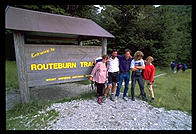 My muscles ached and the day was cloudy, but the forest was peaceful.
It was a short walk to the northern end of the Routeburn Track, where we caught
the daily bus to Queenstown, tourist Mecca of the South Island. There are a
lot of perfectly situated towns in New Zealand, but Queenstown is just a little
more perfect. It sits on the shore of Lake Wakatipo, another mountain-ringed
beauty, which makes for good hotel balcony sitting and a lively trade in
tourist steamers. In the winter, the mountains are perfect for skiing. In
summer, you have your choice of mountain biking, white water rafting, or
jetboating.
My muscles ached and the day was cloudy, but the forest was peaceful.
It was a short walk to the northern end of the Routeburn Track, where we caught
the daily bus to Queenstown, tourist Mecca of the South Island. There are a
lot of perfectly situated towns in New Zealand, but Queenstown is just a little
more perfect. It sits on the shore of Lake Wakatipo, another mountain-ringed
beauty, which makes for good hotel balcony sitting and a lively trade in
tourist steamers. In the winter, the mountains are perfect for skiing. In
summer, you have your choice of mountain biking, white water rafting, or
jetboating.
We found Queenstown was packed with young Kiwi lowlife, for it is the
traditional New Year's gathering for Kiwis who want to get drunk and sleep with
strangers. Still, "packed" and "lowlife" in New Zealand don't have the
feverish intensity that they do in Manhattan so the compact town was coping
gracefully.
All of our desires were gratified in Queenstown. I showered and shaved at the
town's shimmering outdoor pool, then stripped to a pair of gym shorts and
washed everything else in a laundromat. Marc had been desperately trying to
cash a personal check from his bank in Australia, but could never find an open
bank; I selected one of Queenstown's 10 bank machines and withdrew NZ$300 for
him. Some people even admitted to patronizing Kentucky Fried Chicken,
McDonald's, and Pizza Hut, though I personally ate a delicious salmon sandwich
at a "health food" restaurant (if it isn't fried or boiled until gray, it
qualifies as health food by Kiwi standards).
After everyone was sated, we drove 20 km north along Lake Wakatipo to a
beautiful lakeside campsite. Brigitte shared my tent, but only after making me
promise "to be a good boy."
January 2
Micha told us that the ride into town was "mostly flat," but he had been
suffering from a credibility problem in this area. Tremendously strong and
driven, Micha simply could not accept that 1000 meters of climbing made a bike
ride tougher than one with 100 meters of climbing. We probably should have
noted the fact that Melanie, despite her beautiful strong legs, refused to go,
declaring the road to be too rugged. Marc, Terry, and I were tired before we
had even climbed out of the campsite onto the paved road. There were brutal
climbs up the mountain every kilometer and then we would tragically lose all
the altitude we'd just gained, only to have to do it all over again in the next
kilometer.
When we finally rolled into Queenstown, I relaxed in the botanical gardens,
which overlook the lake. Here there is no hint that the culture of Empire has
been overthrown by international mass tourism. On the perfectly-groomed
bowling green, I watched several impeccably-dressed gentlemen play. They would
first roll out a small white ball, then try to get larger balls as close as
possible to the white marker ball.
Coming back to the harbor, I happened upon a Backroads cycling tour group. My
Flying Kiwi mountain bike wasn't bad, particular as it was brand new, but I was
envious of the 20 identical beautiful road bikes being used by the Backroads
tourists, most of whom appeared to be aging California yuppies. They were just
winding up their 14-day tour and looked about as refreshed as you'd expect for
folks who'd been staying in the South Island's finest hotels. When I reflected
that they were paying about five times the price per day as the Flying Kiwi
tourists and that we had 11 young single women on our trip vs. zero on theirs,
I felt that my $500 had been well-invested.
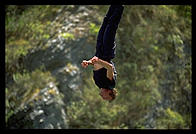 After I rejoined the bus, we drove to the A.J. Hackett "baby bungee" bridge.
A.J. is the guy who started the "sport" and there were at least a hundred
people waiting to jump or watching. This qualifies as a mob scene by South
Island standards. Alex, Stefan and Klaus acquitted themselves with style
during the 45 meter drop and subsequent bounces, yet nobody was impressed.
Marita and Dorothea had gotten up at 6 am to ride a jeep into the bush and do
the "real bungee" jump off a remote bridge that is 70 meters high.
After I rejoined the bus, we drove to the A.J. Hackett "baby bungee" bridge.
A.J. is the guy who started the "sport" and there were at least a hundred
people waiting to jump or watching. This qualifies as a mob scene by South
Island standards. Alex, Stefan and Klaus acquitted themselves with style
during the 45 meter drop and subsequent bounces, yet nobody was impressed.
Marita and Dorothea had gotten up at 6 am to ride a jeep into the bush and do
the "real bungee" jump off a remote bridge that is 70 meters high.
I tried to get a few decent pictures, but it was tough to focus on the rapidly
moving jumpers and a policy change by A.J. Hackett ensured blandness. It seems
that one formerly could jump for free if one were willing to do it naked.
Unfortunately, so many people took advantage of this offer that they
discontinued it.
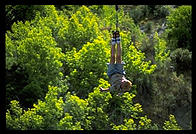
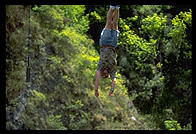
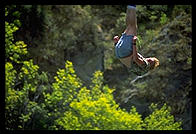
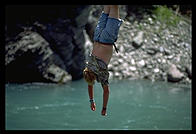
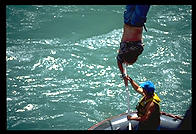
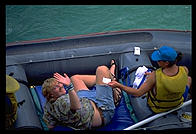
Micha let us off by the shores of Lake Hawea so that we could bike 20 km to our
dinner site. I rode with Melanie and coached her up some big hills. She was
attacking each hill like an enemy, pushing a big gear and pedaling like crazy,
only to run out of energy halfway up and have to get off the bike. I pulled up
next to her and made her shift into the granny gear and pedal slowly.
"How long could you keep that up?" I asked.
"Forever."
"How long is the hill going to last?"
Melanie had an attractive face framed by long brown hair, but when she smiled
she was truly radiant. I could have ridden with her all day.
At 7:30 we stopped at a roadside cafe in Makarora and about 12 of us decided to
embark upon the "Siberia Experience." We walked out in a field and boarded a
Cessna 185 for an eyeballs-to-the-peaks flight to the heart of Mt. Aspiring
National Park: Siberia Valley. I decided then and there that if I ever were
to live in New Zealand, I would learn to fly. Small planes never struck me as
especially fun in Massachusetts, where the landscape is flat and unimpressive
from any altitude. However, on the South Island, as soon as you lift off the
ground, you are filled with wonder and awe at the majesty of the mountains,
lakes, and waterfalls. Flying becomes a five-minute cure for cynicism.
Siberia Valley is narrow and deep and a gradual approach to the grass airstrip
wasn't possible. Our pilot put the Cessna into a sharp turn to lose altitude
in a hurry, which made my fellow passengers quail, then we were bumping through
a meadow and unloading our bags quickly so that the plane could go back for the
next group.
We sat around in a circle chatting on the soft meadow, then retired to our
tents. My tent was pretty cozy, filled as it was with two backpacks, three
mattresses, me, Brigitte, and Beate.
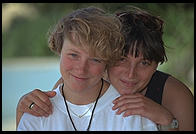 Beate was Brigitte's friend from university and companion for a three month
work-study stay in New Zealand. They were both studying agricultural
engineering, but came from different kinds of families. Brigitte was from a
tiny village in the Black Forest, Beate from a more privileged, more urban
home. Although she was only 21, I thought of Beate as the consummate
SuperGerman. Beate always appeared composed and well-adapted, with the right
tool in her hand despite the fact I never saw her dig through her minimal
luggage. Her composure extended to settled attitudes about education and
romance, ones that she did not seem destined to reexamine. Although I worried
that she would never be able to understand or tolerate different points of view
or lifestyles, I grew very fond of Beate the more time I spent with her. Some
cultural differences misled me into thinking she had a heart of stone at first,
Beate was Brigitte's friend from university and companion for a three month
work-study stay in New Zealand. They were both studying agricultural
engineering, but came from different kinds of families. Brigitte was from a
tiny village in the Black Forest, Beate from a more privileged, more urban
home. Although she was only 21, I thought of Beate as the consummate
SuperGerman. Beate always appeared composed and well-adapted, with the right
tool in her hand despite the fact I never saw her dig through her minimal
luggage. Her composure extended to settled attitudes about education and
romance, ones that she did not seem destined to reexamine. Although I worried
that she would never be able to understand or tolerate different points of view
or lifestyles, I grew very fond of Beate the more time I spent with her. Some
cultural differences misled me into thinking she had a heart of stone at first,
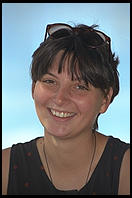 but she proved capable of real feeling and sensitivity.
but she proved capable of real feeling and sensitivity.
Whatever the composition of her heart, there was nothing wrong with Beate's
exterior. She was compact with a Dorothy Hamill shock of brown hair, a round
face, round glasses, and brown eyes that somehow sparkled all the time from
underneath the longest eyelashes I've ever seen. If I had to choose one word
to describe her, it would be "round." She had a feminine roundness in her
face, breasts, hips, and legs. Definitely not the anorexic fashion model
figure, but a look that grew on me with each day.
January 3
Beate struggled horribly to wake up at 7:30, but after the struggle was
complete, she emerged from the tent looking 100% fresh and hollered "GET UP YOU
LAZY BUMS" to everyone else.
We packed our tents, sleeping bags, and backpacks and left them by the side of
the airstrip. The pilot was flying some folks in this morning and said it
would be no trouble to pick up our luggage. Before we started hiking back to
civilization, we had to ford a freezing mountain stream flowing swiftly over a
20-meter wide bed of slippery rocks. I was apprehensive about it, but Ken was
genuinely scared. I held his hand and led him over the rocks and through the
thigh-deep water. My fear evaporated when I felt that he was even more scared
and needed my help.
Micha had described the trail out of the valley as "mostly flat" and told those
without hiking boots not to worry, but I found it hard going even in the
Gore-Tex boots that I had come to cherish. Like everything else in New
Zealand, the trail rose and fell relentlessly. Slippery moss-covered stones
and rocks didn't help. Although the track was fairly well blazed, Klaus,
Stefan, Terry and Ken managed to get lost for awhile.
Around 11 am we came to the spot where the stream we had been following flowed
into the Wilkin River. A few minutes later, the roar of a jetboat greeted our
ears. It wasn't the pickup we'd been promised, though, just a Kiwi family out
for a day of fishing in what looked like a homemade welded steel craft.
English farmers came to New Zealand in the 1830s and for nearly a century
getting a spare part generally meant waiting for a boat to come from England.
That made New Zealand farmers into legendary mechanics. Kiwis claim that a
South Island farmer developed and flew a practical airplane a year before the
Wright brothers, but that poor communications resulted in him not getting
credit for the achievement. It is beyond dispute that a New Zealand farmer
invented the jetboat, which operates by sucking water in from the front and
spitting it out the back in a powerful jet above the waterline. With no
exposed parts, jetboats can operate in 10 cm of water and travel up to 100 kph.
The only thing that has kept the design from supplanting traditional craft is
that jetboats gulp fuel.
After another 10 minutes, two jetboats arrived and took us on a wild 60 kph
ride down the Wilkin, around rocks and under low tree limbs. We got vivid
demonstrations of the efficacy of the jet for hosing down people in other boats
and cows grazing 20 meters away on the riverbank, then were reunited with the
Flying Kiwi bus and our flown-out packs.
At the top of the Haast Pass, I got on a bike for an effortless 15 km cruise
through a river valley punctuated by waterfalls. By 4:15 we found ourselves on
the west coast. Micha spoke of a "very flat" bike ride up the coast. Terry
and I started north in a great mood. The going was flat, the air still, the
sky blue. The scenery was similar to that on the California coastal highway,
but with 1/100th the traffic. After about 20 km, however, we were confronted
with a 150 meter climb up the coastal range and we went up and down the same
100 meters repeatedly after that for another 40 km. We were knackered when we
rolled into camp around dinner time.
January 4
Our campsite by Lake Paringa was sunny but sandfly-ridden. I was coming
to appreciate how nasty these creatures could be. When not inside the bus or
tent, one had to keep moving at all times or risk being consumed. Beate,
Christine, and Nadja jumped into the warm-for-New Zealand (65deg.F) water and
swam 700 meters or so to the other side. Christine belied her Princess
appearance by swimming powerfully. Nadja's strong performance was no surprise,
for she is a veteran of an organized sport in Europe that would in the U.S. be
circus horse gymnastics, i.e., one must stand on the back of a running horse.
Nadja came from a Swiss village of 500 and had an open and playful disposition.
She spent a lot time caring for Rubin and Milu, who were actually remarkably
well-behaved most of the time and impressively bilingual.
Alex and I jumped in after the women, but turned back after going halfway
across, numb from the cold water. Alex was good company. He didn't say too
much but when he spoke it was always worth hearing and often entertaining.
Contretemps between Melanie and Micha/Lucy resulted in Melanie picking up her
two backpacks and hitching a ride north. After 12 days on the road together
during the coldest and wettest New Zealand summer in memory, it was a miracle
that there hadn't already been more conflict, but people didn't see it that way
at the time. Everyone was sorry to see Melanie go and moved sluggishly. It
was 3:30 pm by the time we finally set out for what Micha called the "easy 5
hour hike" from Highway 6 to the Welcome Flat Hut on the Copland Track. The
big draws on this hike were escaping the tension on the bus and hot springs at
the hut. We were in a holiday mood with six hours of daylight left.
Each successive bit of information we collected dampened that mood: the sign
that said it should take 6 hours; the young fit guy who'd walked down in
7 hours; the two women who'd walked down in 8.5 hours; the three thigh-deep
crossings through fast rivers. We did the last four hours at a pace and in a
mood appropriate to a Vietnam War operation. I forgot to enjoy the scenery or
thank God that it didn't rain much. I felt pretty proud of myself for getting
to the hut around 9, although Brigitte had arrived at 8:30 without feeling that
she'd exerted herself. Some combination of perfect genes, the agility of a
mountain goat, being aged 22, and weekend hikes in Germany had made Brigitte
into the kind of person for whom Micha's estimates were designed.
Welcome Flat's hot springs had been channeled into mud-walled pools of
different temperatures. Brigitte, Marita and I were the last to arrive at the
springs and found the others decked out in bathing suits and looking ready for
the Holiday Inn Jacuzzi. We stripped and luxuriated despite the sign warning
of a horrible meningitis that one could contract from the water.
Brigitte had insisted that we pack my tent and she turned out to be prescient,
for the hut was full. We could have found a bit of floor space in the common
room, but pitching the tent on the wonderfully soft grass of the helicopter
landing pad was much nicer. Out site looked up at glacier-covered peaks and
out over a river gorge.
January 5
This was the day my honeymoon with New Zealand ended.
The night was bad. Brigitte was constantly slapping at sandflies. They must
have preferred her creamy skin over Playboyesque figure to my hairy hide over
decrepit carcass because I wasn't bitten at all. Sleeping with two women is
great, but when one's relationship with both is undefined, it is a little
confusing. Those who had stayed with the bus were waiting for us in a dreary
parking lot, so the objective was to get back as quickly as possible. I set my
alarm watch for 5:15, which is apparently when I do some of my best sleeping
because I slept right through it. At 6:15, Marita said firmly "Philip, it is
time to get up."
We staggered out of the tent and into the hut for a breakfast of cheese
sandwiches. These were hard-core cheese sandwiches. Two pieces of
mass-produced bread and one slab of cheese. We never even did find out what
kind of cheese we were eating, for in one of the greatest dairy countries in
the world, cheese comes mostly in huge bricks labeled "CHEESE" in huge letters
and either "mild" or "tasty" in tiny letters in parentheses below. These
bricks cost almost nothing, but they are ill-suited to a sandwich without
tomato, lettuce, or mustard. As I forced the nutrition down my throat, I hoped
that I would never have to eat another cheese sandwich as long as I lived.
While we were enjoying our breakfast, Dorothea lectured us on how late we all
were, for Klaus and Stefan had apparently not been early risers either. There
were reserves of tenderness in this 29-year-old German nurse, but she didn't
squander them on those who do not fulfill their obligations, real or imagined.
Responsibility is Dorothea's sacred cow and I felt that I was getting some
insight into what it must have been like to serve in the German Army when the
Russians were marching west.
If I had enjoyed people telling me what to do, I probably wouldn't have moved
out of my parents' house when I was 15 (oh yes, and I'd probably have a job
too). I told Dorothea and Brigitte to relax and hit the hot springs, since
even if they left at 8 am, they were sure to be back before the sandal-clad
Klaus, for example. They insisted on martyring themselves, however, and set
off at a killing pace. Klaus, Stefan, and I rolled out of the hut at 7:07 into
a light rain and chill. We grew warm with exertion, but the rain steadily
increased to a drenching downpour. Like an idiot, I hadn't put on my rain
pants so my Gore-Tex boots filled up with water from the top. Also, my shorts
were wet and my legs began to get cold. Much of the track was just hopping
from stone to stone over streams and mud. Brigitte had done this aplomb the
day before but it seemed like a doubtful proposition in the wet. Every stone
was covered with water, moss, slime or all three and presented an opportunity
to break an ankle.
Adding to the Deliverance atmosphere of the walk down were the
suspension bridges over streams, which were, shall we say, not built according
to the specifications of the MIT Department of Civil Engineering. Two steel
cables carry the load and the bridge itself is ordinary chain-link fence hung
between them. A single 2x12 wooden plank resting on the bottom of the U formed
by the chain link provides comfortable, if slippery, footing. A sign reading
"One Person Bridge" compensates for the fact that one's life is hanging by a
chain-link fence. Even if you believe in the engineering of these things, the
fact that every step causes the entire to structure to sway is unnerving.
The Bridge over Architect's Creek was my favorite. It didn't have full
chain-link so that one slip and you were in this charming little stream.
First, you'd fall 13 meters, then be swept away by a torrent of water flowing
at 50 kph and hurtled over some rocks 30 meters into a rock-strewn chasm below.
We stepped carefully.
After three hours, every step was costing me. I had blisters on my blisters;
sandfly bites on my sandfly bites; a sore neck from staring down at my feet for
nine hours; fatigue from not sleeping enough; fatigue from walking too much;
fatigue from hypothermia; fatigue from the torturous pain in my feet. I was
close to delirium and am not sure that I could have made it without Stefan and
Klaus. They not only stuck with me, but helped me over the tougher obstacles,
e.g., when we had to scramble up a meter-high rock.
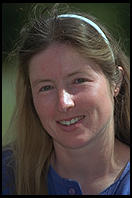 We got back to the bus at 1:15, tired, wet, and sore through to the bone.
Those who stayed behind had suffered horribly from sandflies and boredom.
Christine's beautiful face and legs were mottled with sandfly bites. Though
she never complained, every time I looked at her I felt that a great work of
art had been disfigured. Klaus had some angry words in German with Micha about
him not giving us enough information about the hike. Lucy snapped back in
English that he had to take responsibility for himself. I didn't feel angry
with anyone, but just wanted to get warm and rest; I stripped off my wet
clothes and got into my sleeping bag without saying much.
We got back to the bus at 1:15, tired, wet, and sore through to the bone.
Those who stayed behind had suffered horribly from sandflies and boredom.
Christine's beautiful face and legs were mottled with sandfly bites. Though
she never complained, every time I looked at her I felt that a great work of
art had been disfigured. Klaus had some angry words in German with Micha about
him not giving us enough information about the hike. Lucy snapped back in
English that he had to take responsibility for himself. I didn't feel angry
with anyone, but just wanted to get warm and rest; I stripped off my wet
clothes and got into my sleeping bag without saying much.
We continued north up the coast and stopped at the Fox Glacier cafe where I was
thrilled about the idea of eating anything other than a cheese sandwich.
Nobody wanted to walk up the glacier face in the rain, so we hung out in the
warm cafe. It wasn't exactly springtime in Paris for me, though. Lucy told me
how upset she was that we hikers hadn't apologized for being late considering
how miserably damp and sandfly-ridden their campsite had been. Dorothea
criticized me for being lazy, i.e. not getting up at oh-five-hundred and being
on the trail by six.
Given the persistent rain, Micha decided we could all benefit from a night in
"civilization," i.e., a roadside bar with bunkrooms near Hokatika. The bar was
filled with smoking locals pounding back ale and speaking with such thick
accents that I didn't understand half of what they said. This asymmetry was a
recurring theme in rural Australia and New Zealand. Everyone could understand
me perfectly and were never even surprised by Americanisms because they watch
so many TV shows from the U.S. Yet I couldn't understand them.
I was graciously invited to have a pint and looked upon piteously when I said
that I didn't drink beer, but this was soon enough forgotten and everyone went
back to their pool table and pitchers. Lucy and Micha had only rented eight
bunks so I decided that I'd sleep on the bus with the others, but Klaus,
Stefan, and Terry had already reserved a bunk for me in their quad room. I
couldn't say no to a real pillow.
January 6
The West Coast is renowned for nasty weather and we weren't disappointed
today. We decided to spend the day in a couple of towns. Hokatika is famous
for greenstone, which is actually a kind of jade. The South Island never had
much of a Maori population and is today 99% white so that one doesn't come here
to look for native crafts. I picked out a pair of heart-shaped earrings.
"Which lucky woman on the bus is going to get these?" asked the shopkeeper.
"I wish I knew myself," I replied.
Brigitte and I strolled through town where we found some beautiful handpainted
T-shirts. Unfortunately, the one I bought shrunk into a strange, useless, and
much too small shape when I got it home. The inability of other countries to
make decent T-shirts is something that I will never understand, but I'm sure
that Americans will be grateful for it when the last Detroit factory has rusted
away and Hanes and Jockey are our only exports.
When Brigitte and I were alone on the beachfront, I presented her with the
earrings, which she accepted with first reluctance and then a grateful kiss.
Lunch in Hokatika was a fine example of small-town New Zealand cuisine, which
is to say that it would also have been a fine example of 1950s English cuisine.
Determined to experience the local specialty, I had a whitebait omelet
sandwich. Whitebait are little fish that are bound together, complete with
bones, by omelet. Needless to say, this was extremely nasty. In fact, I'd
begun to notice that my pants were all getting too big. Between the cheese
sandwiches, the biking, and the complete lack of spices in any food that we
didn't cook ourselves, I had simply stopped eating for pleasure.
Greymouth, with its population of 3000, seemed a real metropolis after
Hokatika. Terry, Lucy, Melanie, and I were in a "cooking group," which had
initially seemed cushy because of the knowledgeable Lucy and energetic Melanie,
but Melanie was gone and Lucy was generally rather worn out from leading the
tour and managing her kids. Today was our day to cook and Lucy had done more
than her share of shopping, so Terry and I volunteered to restock the food
coop. We decided to cook tacos and scrounged up the necessary ingredients in
the supermarket. Twenty-five km short of our campsite, Micha asked if anyone
wanted to cycle. Terry, Stefan, Lucy, and I were the only takers but Terry and
I asked if we'd be back in time to cook. Micha said "no problem, take your
time, stop at the pancake rocks."
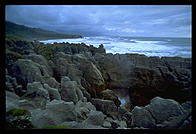 The ride was tiring and included a rainshower, but we had a nice stop at a pub
in Derrytown. Conversation was easy, Coke was 90 cents (NZ), and the strong
light outside whispered to us that we had plenty of time. Lucy left us a
little early and Terry pulled away from me on the road. I rode about as fast
as I could, including a quick mountain bike circuit of the famous pancake
rocks. These are sedimentary rocks that look like pancakes in the cross
sections that are visible because of pounding by the surf. Several blowholes
add to the excitement.
The ride was tiring and included a rainshower, but we had a nice stop at a pub
in Derrytown. Conversation was easy, Coke was 90 cents (NZ), and the strong
light outside whispered to us that we had plenty of time. Lucy left us a
little early and Terry pulled away from me on the road. I rode about as fast
as I could, including a quick mountain bike circuit of the famous pancake
rocks. These are sedimentary rocks that look like pancakes in the cross
sections that are visible because of pounding by the surf. Several blowholes
add to the excitement.
When I rolled into camp, numerous people were cooking under Lucy's supervision,
the menu had been changed to chili from tacos and the very idea of tacos was
derided.
People were really enjoying being heroes and martyrs and nobody questioned the
idea that we were "late" despite the fact that there wasn't a fixed time for
dinner and that nobody had told us they wanted to eat by a certain time. About
only people who didn't abuse us were Klaus and Brigitte, who were among the
hardest working, but Dorothea more than made up for their indulgence by
excoriating us in a voice that sounded to me like the New Jersey state anthem
played on an electric shaver.
Ken's English had scarcely improved during the trip, so Terry and I decided to
give him an English lesson at dinner: "when you really love a group of people,
here is what you say `you can all go fuck yourselves.'"
Terry and I were saddled with the entire cleanup, usually done by four
people.
January 7
I was awake at 6 am but was reluctant to exchange the security of the
tent and the pleasure of Brigitte's company for the angry mob outside. The
first word I heard upon exiting the tent was from Trudy, whose heavy articles
I'd carried on the Routeburn.
"Look at these cutting boards. You call these clean?"
I wanted to remind her that they'd been washed in the dark while Lucy et al.
harangued us.
"Since you didn't work last night and some cooking group members might be back
late today from the cave tour, you should also cook tonight," Christine
helpfully suggested.
"You and Terry can write about how you survived the Flying Kiwi without washing
a single dish," Micha chimed in.
"Oh yes," I replied, "it was really nice to have Melanie washing everything
while we kicked back." This was a truly nasty swipe at Micha and Lucy for
driving our sweet companion off in tears. Boston nastiness is trump over New
Zealand nastiness and Germans trying to be nasty in English and thus we earned
some peace.
Terry and I spent the day mountain biking on Bullock Creek Road, an unmarked
gravel road leading up through a forested canyon into a flat valley surrounded
by mountains and graced with meandering rivers. Terry and I rode side-by-side
and I got to see a new side of his personality. In dozens of hours of
conversation and 400 km of biking, this man had never said an unkind word about
anyone. I figured that he must be constitutionally incapable of viciousness.
Yet, he roundly abused the women, especially Dorothea and Lucy, whom he felt
had just been itching for an excuse to beat up on us. I had almost calmed him
down when we remembered that we'd also done an hour's shopping the day
before.
Once up in the valley, we took off onto what Kiwis call a "pack track." This
was a gravel road just wide enough for a hiker and it cut through a dense beech
forest. This was real mountain biking at last and we forgot the ugly events of
the preceding 15 hours. Coasting back down to the coast was almost as fun as
the singletrack, until it began to pour. I curled up with Illywacker,
which I felt as though I'd been reading forever, and Beate under a sleeping bag
in the back of the bus.
Dorothea led the cooking crew in the production of an excellent pasta dinner in
the campground kitchen. I was beginning to notice that the German concept of
healthy must be a little different from the American one. Dorothea, a nurse,
smoked heavily and cooked everything with generous portions of cream and
butter. The rain let up just as we were ready to eat, so we sat outside at
picnic tables marveling at the clear views to the coastal mountains.
Ken was slurping his noodles noisily, oblivious to the fact that none of the
Westerners were doing likewise. It was almost exactly like the Italian
restaurant scene in the movie Tampopo where a Japanese etiquette
instructress is teaching 15 girls not to slurp their linguini, but a slob
sarariman slurps obliviously over her instruction and induces the girls to do
likewise. The German women were laughing cruelly at poor Ken, but he didn't
seem to notice.
Towards the end of dinner, Beate suggested, in all seriousness, that Terry and
I once again do all the dishes. I asked Ken to repeat the phrase he'd learned
the night before ("you can all go fuck yourselves") and he proved to be not as
bad an English student as he appeared, for he not only remembered the phrase
but mouthed rather than spoke one word.
Around 11, we all got together again to celebrate Alex's 26th birthday. Saeko
somehow procured an enormous chocolate cake for the occasion.
The big excitement for the night, though, was that Stefan kicked Klaus out of
the tent and replaced him with the substantially more comely Caroline.
January 8
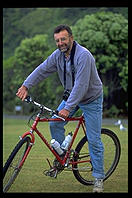 Brigitte woke me up around 6:30 to ask the time. I grunted "don't
worry, Dorothea will take care of that." At 6:55, Dorothea bellowed "Auf
Staen" ("get up," literally "stand up"). We left at 8 pm after some farewell
photos of Terry, who was riding south with a trucker to be sure of catching a
plane in Christchurch.
Brigitte woke me up around 6:30 to ask the time. I grunted "don't
worry, Dorothea will take care of that." At 6:55, Dorothea bellowed "Auf
Staen" ("get up," literally "stand up"). We left at 8 pm after some farewell
photos of Terry, who was riding south with a trucker to be sure of catching a
plane in Christchurch.
After driving through light drizzle for a couple of hours, we stopped for some
whitewater rafting down the Buller River. About half the Flying Kiwi
contingent continued into the town of Westport while the half who had chosen
rafting squeezed into Buller Adventure's van, Christine sitting on my lap for
the 30 minute ride.
Christine and I shared our raft with M.J. and Randy, two rugged Montanans who
had their own whitewater raft back home. M.J. looked like the classic Western
woman, tanned and freckled with a wide and open face. Randy looked like the
kind of American husband that one sees in minivan ads, with a slight paunch
filling out his polo shirt.
New Zealand river guides are probably the most professional in the world and
ours were thoughtful to boot. Gavin, guiding my boat, had been a schoolteacher
in England until he got tired of the grind.
The river was simply terrifying. Other whitewater raft trips I understood:
water flowed gently down the flat portions of the riverbed and fast over sloped
portions or where rock obstructions constricted the flow. The Buller River was
a "big water" river that moved fast all the time. Occasionally the flat
surface of the water degenerated into roiling enormous waves for no apparent
reason. Gavin said that there were submerged rocks, but we seldom saw any.
The waves were hard to miss, though, being at least 6' high and, unlike ocean
waves, were in no way predictable. You just paddled through them for dear
life, half the time catching air.
It seems that on 20% of the trips, a raft tips over. Alex's presence on the
other raft sealed its fate. He had tried every adventure sport, from hang
gliding to parachuting to climbing, and hurt himself severely with each one.
Alex's body was held together with good Swiss stainless steel pins in several
places, although it didn't seem to bother him. I was still trying to figure
out how he avoided injuring himself in the bungee jump; the man was a walking
catastrophe. Saeko, Ken, Caroline, and Stefan would have avoided his raft like
the plague if they'd been thinking.
We'd been keeping fairly close tabs on our companion boat but we never saw them
in trouble or flipping over. Our first clue that something was wrong was
seeing them floating downriver clinging to their overturned raft. They were
holding onto what is colloquially know as the "O.S. rope," which runs around
the edge of the raft. They looked shell-shocked and not even happy to be
alive, with the river water streaming out of their helmets like tears.
We hauled the survivors into our raft and learned that they had overturned in a
rapid and had been held under by the waves and raft. Their guide stayed in the
water and righted the raft with our assistance. At this time it became clear
that Alex was not only missing but in no danger of floating down the river
anytime soon.
Saeko was sobbing uncontrollably, like Anna Karenina when Vronsky fell off
Frou-Frou in the steeplechase. The mystery of their true relationship was
solved. Gavin made her bail to take her mind off the unaccounted-for Alex
while we commenced the difficult task of paddling up a powerful whitewater
river, moving up tortuously through the eddies along the banks. One guide
would get out and hold the boat with a rope while we paddled furiously.
Progress was measured in meters.
After about 30 minutes, we spotted a smiling Alex on the other bank. Dorothea
hollered to him in German to wait for our signal, jump, then grab the throw
rope. The actual rescue went as planned and, once on board, Alex explained
cheerfully that he'd tried to jump back in the water and float down to us, but
he was trapped by eddy currents near the shore. He had landed his boat's lost
paddles and was waiting calmly for us, the only one of the group who did not
appear to have been stunned by the experience. Caroline said simply "it was
the scariest experience of my life," and several others nodded their
concurrence.
As we were taking off our wetsuits, I taught Ken to say "I got my ass thrown
out of the boat by a big wave."
During the bus ride through the interior toward Ruby Bay, I felt sick and
tired, but as soon as I got out and onto a bike, my head cleared. It was a
beautiful 40 km ride down the Mot river then to McKee Reserve to camp. The
Automobile Association map shows five towns along the route, but we didn't pass
a single gas station, restaurant or convenience store. We did see a lot of
gentle farmland, surrounding hills and mountains, and animals. The sun was
shining and we took our time, not rolling into camp until 8:30 pm by which time
a fish/steak barbecue was beginning to bear fruit. Poor Beate had been
vomiting all day so I was shocked that she still had enough energy to make a
nasty comment about my being late for cooking two days before.
January 9
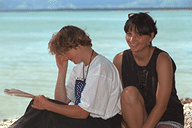 This is the sunniest portion of the South Island and we were blessed
with blue skies at our fabulous beachside campsite. We broke our last camp at
10:30 for the ride to Nelson, a surprisingly prosperous and large town. My
primary objective around noon was to either vomit or die or both, but somehow I
couldn't manage to do either. Marita had been the original source of this flu,
but she was sufficiently recovered to resume her professional duties as a
nurse. I lay on a bench in the sun with my head in her lap.
This is the sunniest portion of the South Island and we were blessed
with blue skies at our fabulous beachside campsite. We broke our last camp at
10:30 for the ride to Nelson, a surprisingly prosperous and large town. My
primary objective around noon was to either vomit or die or both, but somehow I
couldn't manage to do either. Marita had been the original source of this flu,
but she was sufficiently recovered to resume her professional duties as a
nurse. I lay on a bench in the sun with my head in her lap.
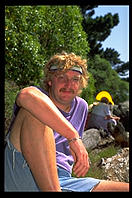 Although Nelson is famous for its cathedral, the high point of my visit was
running into the smiling Melanie and her Israeli companion Naomi. Naomi looked
as thick and sullen as Melanie did thin and bright. Naomi's gaze seemed to
have a critical element to it and I sensed that I'd been found wanting. She
reminded me of "Natalie," the girl who'd been responsible for my taking the
Flying Kiwi tour in the first place.
Although Nelson is famous for its cathedral, the high point of my visit was
running into the smiling Melanie and her Israeli companion Naomi. Naomi looked
as thick and sullen as Melanie did thin and bright. Naomi's gaze seemed to
have a critical element to it and I sensed that I'd been found wanting. She
reminded me of "Natalie," the girl who'd been responsible for my taking the
Flying Kiwi tour in the first place.
Maybe it was the flu, but I thought I felt a twinge of guilt for preferring the
German girls I'd been with to most of the Jewish girls I could bring to mind.
By the time we arrived back at the Flying Kiwi hostel in Picton, our group was
sadly diminished. A bunch of people had stayed in Nelson, preparing to hike or
kayak in the fabled Abel Tasman National Park. I all but collapsed into bed
and was cared for by three women: Christine with peppermint tea, Beate by
bringing my luggage in (no small task), Brigitte with caresses.
On balance, though, I'd have to say that the day should have been cause for
celebration, for I finished the dreadful Illywacker.
January 10
I said my good-byes to Lucy and apologized for my role in fomenting
discord. She was friendly and efficiently tallied up my final bill. Something
had happened with exchange rates that I didn't understand, but I ended up
getting piles of cash back from what had only been a US$495 check to begin
with.
It is a six-hour train ride down the coast to Christchurch and there are two
ways to do it. One is in a brand new car with panoramic windows, air
conditioning, and a high-tech suspension for a smooth ride. The cost was
NZ$63,. which was absurdly cheap by AMTRAK standards but all my price thoughts
were now in New Zealand dollars: "I could get five nights in a backpacker's
for that"; "I could buy 63 sandwiches in a tea room for that." I opted for the
NZ$24 "backpacker's carriage," which is actually just a standard AMTRAK-type
train car.
A young boy with a pasty complexion, rather flat face, and clipped vowels was
creating a bit of a stir in my part of the car. I looked up from The Savage
Crows, another paragon of modern Australian literature that the world could
probably live without, and started talking to the boy's father. Alex was a
dairy farmer on the west coast of the north island.
"I started out as a share-milker. A farmer owns the land and the cows but
doesn't do any work. The share-milker comes in and milks the cows, splitting
the proceeds with the farmer 50-50. After about ten years, I had milked my way
into my own farm."
Was he going to bring in a share-milker himself?
"Oh no. Dairy farming really isn't that hard. I have 140 cows and 300 acres.
I milk the cows twice and day and occasionally mend a fence, but most of the
work is done by machine. I probably have to work two and a half hours per day.
I just let them roam free among 30 paddocks. If they were in a barn, it would
be more work."
Did the government fix the price of milk and buy up huge mountains of cheese
like in the US?
"The dairy industry is completely unsubsidized... has been so for about 10
years. Prices have been good lately."
What about cheese? Wouldn't there be good money in making non-generic
cheese.
"The average Kiwi consumer hasn't any interest in gourmet cheese."
I went back to the buffet in one of the panorama cars. The least disgusting
item on the menu was a semi-greasy lamburger. As I was ordering, another
backpacker came up and took out his checkbook to pay, then hesitated.
"I'm not sure this will be my last trip to the buffet. Would you mind keeping
a tab for me and I'll come back at the end to settle the bill?" he inquired.
The request was immediately granted and it reminded me of how few extended
consumer transactions there are in America. The issue of trust or distrust
never comes up because all transactions are immediately settled or an agreement
is enshrined in a written contract.
When I got back to my seat, Alex's kids were as rowdy as ever. His wife Bev
threatened them with physical violence, but never carried out any of the
threats. I asked them old they were and then told them that I was almost that
age myself, yet had no kids, no wife, no farm, and no career.
"We got married when I was 24," Alex said. "I'm not sure that it would have
been good to wait any longer. Our friends who stay single until they are 30
keep living with boyfriends or girlfriends and breaking up. They say that it
is good practice for marriage, but I think it is just good practice for
divorce. You get comfortable with the idea of leaving someone you once loved
and getting on with your life, you learn that you can be OK without whoever was
your partner."
[ Back | Table of Contents | Map | On to Christchurch ]
philg@mit.edu
Add a comment | Add a link
 My muscles ached and the day was cloudy, but the forest was peaceful.
It was a short walk to the northern end of the Routeburn Track, where we caught
the daily bus to Queenstown, tourist Mecca of the South Island. There are a
lot of perfectly situated towns in New Zealand, but Queenstown is just a little
more perfect. It sits on the shore of Lake Wakatipo, another mountain-ringed
beauty, which makes for good hotel balcony sitting and a lively trade in
tourist steamers. In the winter, the mountains are perfect for skiing. In
summer, you have your choice of mountain biking, white water rafting, or
jetboating.
My muscles ached and the day was cloudy, but the forest was peaceful.
It was a short walk to the northern end of the Routeburn Track, where we caught
the daily bus to Queenstown, tourist Mecca of the South Island. There are a
lot of perfectly situated towns in New Zealand, but Queenstown is just a little
more perfect. It sits on the shore of Lake Wakatipo, another mountain-ringed
beauty, which makes for good hotel balcony sitting and a lively trade in
tourist steamers. In the winter, the mountains are perfect for skiing. In
summer, you have your choice of mountain biking, white water rafting, or
jetboating.












